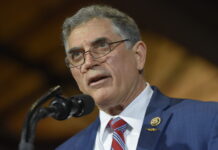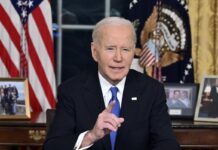
WASHINGTON (GA Recorder) — There was little disagreement among senators Wednesday over whether a national law is needed to standardize what soon will be a patchwork of conflicting state statutes allowing some student-athletes to earn money from their personal brands.
But the Senate Committee on Commerce, Science, and Transportation hearing shed little light on what a potential federal law would look like when a law could come to a vote — and if that can be done quickly enough in light of the fast-moving changes at the state level.
There’s little time for Congress to act before July 1, when new laws go into effect in Georgia and four other states — Alabama, Florida, Mississippi, and New Mexico — guaranteeing the rights of student-athletes to profit off their name, image, and likeness. Georgia Gov. Brian Kemp signed the state’s new law into effect in early May at the University of Georgia recruiting lounge overlooking the field at Sanford Stadium.
More state laws will become effective in the months and years to follow, with 19 states so far approving legislation on these publicity rights.
“The cat is going to be out of the bag, so to speak,” said Matthew Mitten, a law professor and executive director of the National Sports Law Institute at Marquette University in Milwaukee.
“How do you put the cat back in the bag?” after those initial laws go into effect, asked Sen. Jerry Moran (R-Kan.).
“I don’t think you can,” Mitten replied. “I think that is exactly the problem.”
University officials and coaches say allowing the branding contracts on a state-by-state basis will mean some athletes will suddenly have a potential income source, and others will not — resulting in a dramatic effect on recruiting and other aspects of college sports.
While the National Collegiate Athletic Association has begrudgingly said it will alter its rules in the wake of the upcoming state laws, it has not yet done so. A pending U.S. Supreme Court case on a separate but related question involving the NCAA’s limits on eligibility and compensation has further complicated action from that governing body.
“At this point, this is not an issue that the NCAA or individual states can fix,” said Mark Few, head coach of the men’s basketball team at Gonzaga University in Spokane, Wash. “Only action here by Congress can maintain some semblance of a level playing field.”
A handful of proposals have been introduced in Congress so far. Some are focused narrowly on the issue of name, image, and likeness rights, and others seek to address a broader set of issues for college athletes, such as guaranteeing health care after their eligibility ends.
Sen. Richard Blumenthal (D-Conn.), who has cosponsored a broader measure with Sen. Cory Booker (D-N.J.), said Wednesday that he will oppose and seek to block any federal legislation that offers student-athletes fewer protections than the bill approved in his home state.
Blumenthal blasted the NCAA as only willing to revise its own rules on publicity rights because they fear that patchwork of pending state laws.
Pressed by Sen. Brian Schatz (D-Hawaii) on whether the NCAA will file lawsuits against states, NCAA President Mark Emmert repeatedly demurred, saying it would be up to the organization’s board of governors. Eventually, he acknowledged the likelihood.
“I believe for universities themselves to file lawsuits against their own states is a very challenging thing to do,” Emmert said.
Those upcoming laws have already begun to affect recruiting conversations between coaches and prospective athletes.
Dr. Wayne A. I. Frederick, who serves as president of Howard University in Washington, D.C., and also as chair of the Mid-Eastern Athletic Conference Presidents and Chancellors, answered partly as a parent when asked how those differing laws are affecting competition among colleges.
Frederick said his son is actively being recruited by collegiate soccer programs, and coaches from states that have passed name and image rights legislation already are bringing up those possibilities in conversations about playing at their schools.
Speaking from his official role, Frederick said they desperately would like to see federal legislation on this issue. But he also expressed concerns about the financial effects on smaller schools like the Historically Black Colleges and Universities in his conference if that legislation includes broader requirements on medical expenses for athletes or requires hiring additional staffers to comply with new rules.
It’s not clear what the scope of a potential federal bill could be. Sen. Roger Wicker of Mississippi, the ranking Republican on the Commerce panel, argued that a bill narrowly tailored to image rights could be completed faster.
Booker called passionately for a wide-ranging bill addressing issues across a collegiate athletic industry that “too often is exploiting young men and women.” He cited a number of concerns across college sports, including a spate of heat-related deaths at practices, flimsy safety practices surrounding concussions, and the lower graduation rates for Black student-athletes.
“Are our student-athletes, are they truly [at] the center? If they were, we would do something about the forces that are creating such a dangerous environment for them,” Booker said.
There’s a myriad of other thorny issues to untangle even if Congress were to keep a bill limited to just name, image, and likeness rights.
Those include who would oversee this program, whether that’s the NCAA, another organization, or some sort of combination. Mitten also urged that an entity other than the NCAA be charged with certifying agents in an effort to offer protection and guidance for students seeking out representation with potential branding deals.
Any law also would need to address whether individual colleges can put limitations on the types of products an athlete can endorse and whether they could prohibit deals with companies that sell alcohol or tobacco, for instance.
Several experts raised questions over how these rights will work for international students and what it may mean for their visa status and taxes.
Frederick questioned whether loopholes could arise in the current web of state laws, such as if a student plays in a state that allows income from publicity rights, but their home university doesn’t.
The NCAA also has called for protections from lawsuits as they come into compliance with any new laws on publicity rights, a request that some senators expressed skepticism on Wednesday.
As the hearing concluded, Sen. Maria Cantwell (D-Wash.), who chairs the panel, said that senators are “determined to get this done.” She offered no hints at the timing of next steps beyond a promise to hold another hearing that included college athletes among those testifying.







